Yes, I know, forgive me the clickbait title. There’s no secret to art right? We’ve all heard it a thousand times—Hard work on your craft, 10,000 hours on technique, there’s no magic bullet, etc, etc. And it’s true, there’s no shortcut to skill. However, there is one thing you can learn that will act literally like WD-40 to your art career, and get you further faster. It is the thing that will open doors, introduce you to the people you need to meet, get projects green-lighted, cut down on revisions, and get your proposals off the ground. From an Art Director’s point of view it is the thing that makes a good artist into an invaluable artist that everyone wants to work with…
That magic thing is empathy.
Yes, empathy. Sound too simple?
Everyone thinks they know what empathy means. It’s defined as “the psychological identification with, or vicarious experiencing of the feelings, thoughts, or attitudes of another.”
Doesn’t sound like a magic bullet to you right? Often empathy is a happy accident or a symptom of just being a nice person, and some of the very best artists have developed strong empathy unconsciously. Very few people cultivate it as a conscious skill, and I am telling you if you do, you will be a creative ninja.
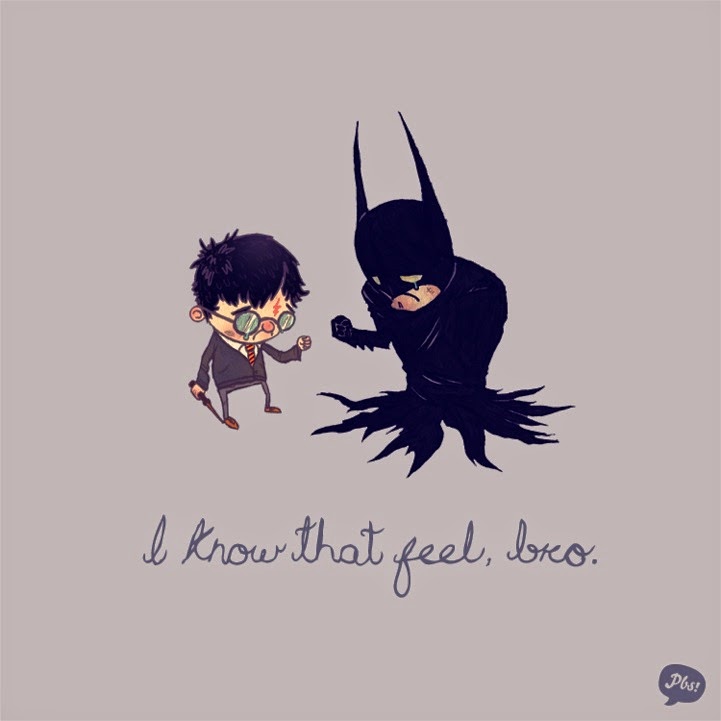 |
| “I know that feel bro” series by Chris Gerringer |
From outside, an Art Director’s job looks like a lot of reading manuscripts, researching artists, commissioning art, giving feedback to artists, and then getting that art onto a thing and out into the world. And while that’s true, the lion’s share of an Art Director’s work isn’t that at all, it’s actually a combination of being a translator, a diplomat, a politician, and a salesman. This is a whole post in itself, but take my word for it, ADs are creatures of empathy. For example, I have to put myself in the author’s shoes, the editor’s shoes, the publisher’s shoes, the reader’s shoes — I have to try on and hold multiple points of view simultaneously — and try to find a way to get all those expectations to align. If my empathy was a muscle, it would look like Arnold Schwarzenegger’s bicep. And I mean Conan-era Schwarzenegger.
The way you use empathy consciously is simple in explanation, a bit harder in practice. What you have to do is picture the person you are trying to please (Art Director, Client, Fan, Gallery, Collector) and picture yourself in their position. As that person, what are your needs? What are your priorities? How might your experience color this interaction? And most importantly, think about who that person has to please. You picture that person, think about their priorities, motivations, and needs, and then you do their job for them, to the best of your ability.
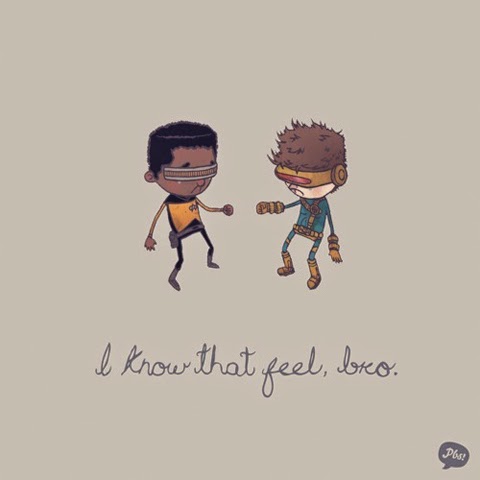 |
| “I know that feel bro” series by Chris Gerringer |
Examples are in order:
• Use empathy to get jobs:
Instead of sending a mass email or postcard promo out, narrow your focus. Make a shortlist of dream clients and do some research on who they’ve hired before, what they’ve done in the past, and what they’re most likely to need. Look at your art objectively. Do you see your work fitting in? Is it at the right skill level? Is your work in the right stylistic ballpark? If so, don’t just send a link to your site. Pick out a few jpegs from your portfolio that most match what they need and attach them to an email. Why would that AD or company want to work with you? What can you offer them? Write a note in the email, not just a form letter. Again, think about your target, and think about how many emails a day they must get from artists. How do you make yours sound genuine? How do you stand out?
Show that you can solve their problems.
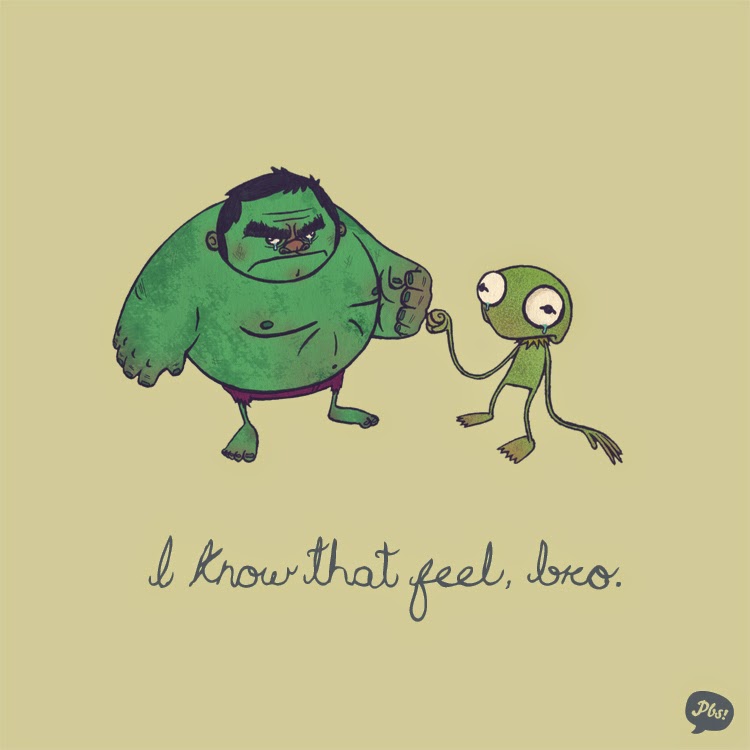 |
| “I know that feel bro” series by Chris Gerringer |
• Use empathy to make Art Directors/Clients happy:
As an artist, your job is to make good art from the details given. That is the minimum. Imagine, from an AD’s point of view, how frustrating it is when an artist only does half the things in the project description, or even worse, doesn’t use the right template or specs. (Hint: It makes you doubt their dependability and it frustrates the sh*t out of you, because it wastes time and now you have to be the bad guy and tell the artist they need to fix it.)
On the next empathy level, think not only about pleasing the Art Director, but think about who they have to please to get approval on your work. Is it an editor? Author? Marketing guy? License/IP approver? An AD’s goal is also to get the best art work possible — but the person that AD has to please has a different priority — to sell the thing your art is on. Is your job going to be on the cover of a book? (That means it has to function as advertising.) Is your work an interior illustration, or art for a game that won’t be seen until the game is already purchased? Then it has different priorities, different goals.
If you keep these priorities in mind, and work them into your compositions, you are a very valuable artist. Many good artists do this subconsciously, as they gain more experience. It is the rare gem of an artist that is doing it consciously.
Show that you are thinking about the bigger picture.
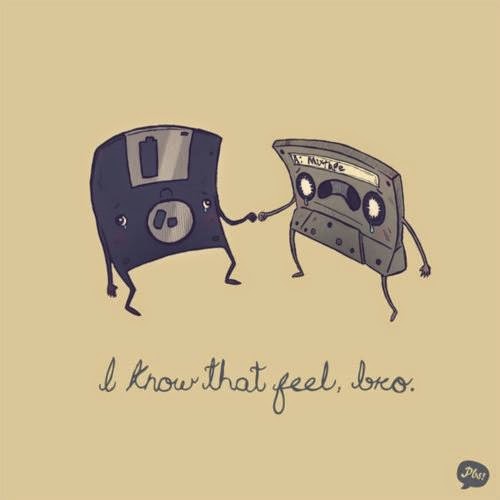 |
| “I know that feel bro” series by Chris Gerringer |
• Use empathy to grow your fanbase and sell your work:
While I always counsel artists to do what they love, and would never want them to abandon that to chase trends, that doesn’t mean you shouldn’t think about who your target audience is, and what their needs are. Why do people share things on social media? Because it makes them look cooler, smarter, or funnier to their friends. Why do they buy prints and originals? Because it reinforces something they like about themselves — it fits into their world, it fits into their self-image. (Even if it’s a present for someone else, it still has to fit their self-image as giver.)
This can affect your choices over both content and style, and while you shouldn’t necessarily give up the artistic wheel to your desired fanbase entirely, you can use it to grow a following and widen the venn diagram of where what you want to do overlaps with what your fans want.
Show that you have exactly what they need.
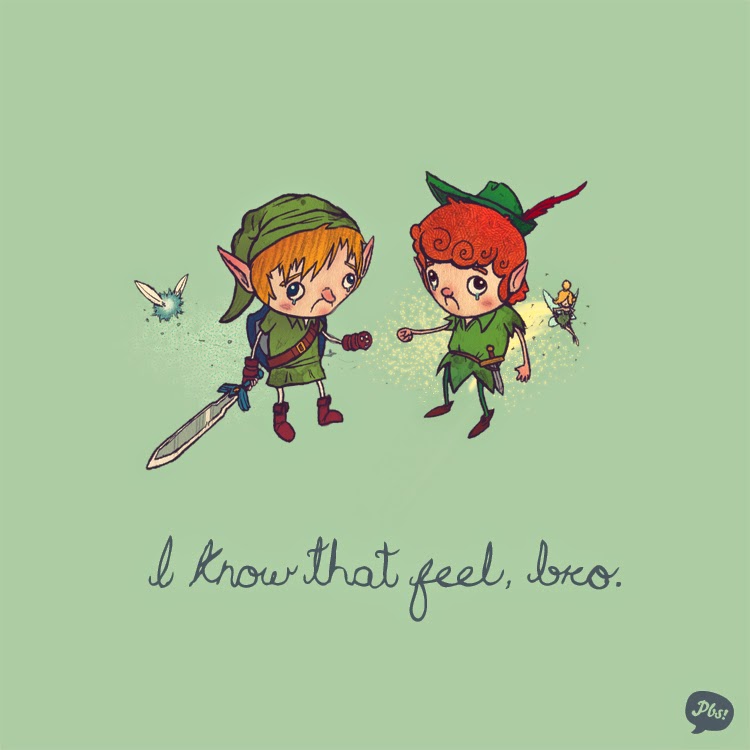 |
| “I know that feel bro” series by Chris Gerringer |
• Use empathy to pitch your project:
People are always asking me how to get into publishing, and this is the place where empathy is most often left out. It’s a personally-driven project, so you’re usually focused on what you want. However when the time comes to write a pitch to sell that project to an agent, or a publisher, or a movie studio, or an investor, empathy is what will make or break you. None of these people want to take on a project without having a clear idea of how they will turn around and sell that idea to someone else one step higher on the ladder. If you are pitching to an agent, try to think about what they’ll need to sell it to an editor. If you’re pitching an editor, think about what they’ll need to sell it to their publisher. If it’s directly to an investor then think about what return on their investment they would expect.
Show that you are thinking about their job, and helping them do it.
 |
| “I know that feel bro” series by Chris Gerringer |
If you are not an empathic person by nature, you may find it hard to hold this style of bi-level communication in your head. Literally role-playing it out by yourself or with someone to talk it through with you is a great tactic. Often just pausing for a minute before you hit send on that email and saying to yourself “how can this be taken the worst possible way” can save you from many pitfalls.
Of course, conscious empathy is an all-around MVP life skill, not just an art skill. Empathizing with people helps you to understand them, and people who feel understood by you want to be around you more, and want you on their team, whether that team be business or pleasure.
I know the saying is about “walking a mile in another’s shoes” but go deeper than that. I want you to try on their underwear. They’ll love you for it.
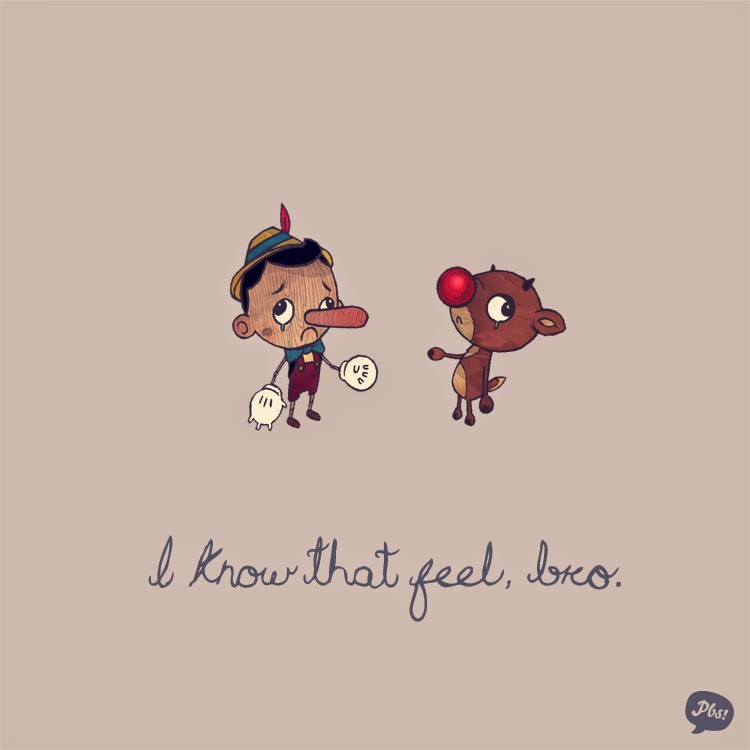 |
| “I know that feel bro” series by Chris Gerringer |
(Disclaimer: Just their metaphorical underwear, not their actual underwear)
And thanks to Chris Gerringer, who gave his permission for me to use his absolutely perfect illustrations for this article. And thanks to Carissa Creveling, who pointed me towards them.


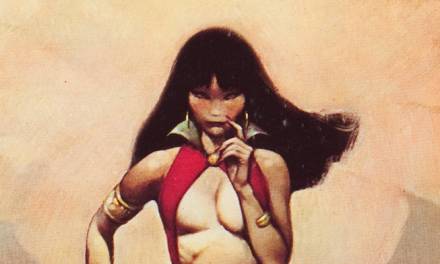


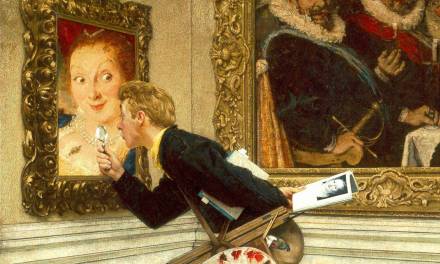
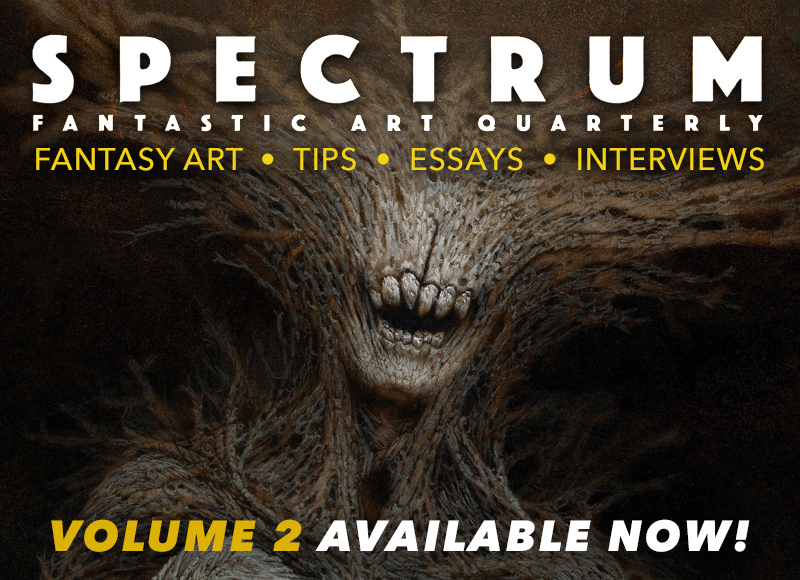
Thank you for this terrific article, Lauren. A wonderful perspective!
I can't agree more!
This post was beautifully written. It is kind of one of those tear-jerking posts that makes you really question what you are doing in your art. I have this funny tendency to question myself and wonder if I would be a good fit for an AD role. I know that it takes time to get to that role and you really have to have to get your foot in an art companies door first, but for some reason that position just feels right…
I was just watching Peter Mohrbacher's One Fantastic Week Series just last night and felt that it fit right into this mindset. It's kind of awesome how sometimes things that you watch or read line up perfectly with one another.
Anyway, thanks for the insights, Lauren.
I am actually working on a “What makes a good Art Director” post too…stay tuned. And thanks to all the AD friends who actually took a little Myers-Briggs personality test for my data-collecting purposes. SUCH GOOD SPORTS.
I think empathy is also helpful for creating artwork. Imagining how the characters you are drawing feel makes it more interesting and you're less likely to make simple mistakes like drawing the character looking in the wrong direction.
Great point I hadn't even thought of. Very true.
Great post with a lot of solid life/career advice Lauren. Although I'm not in the Fantasy Art field, I enjoy a lot of the views and writing here on MC as it's a good diverse group of individuals and perspectives.
I think Life Drawing is one artistic pursuit that can really help develop empathic skills, as there are not many instances in life where you stare at a single person in quiet for sometimes hours on end. The dominant culture would probably deem this “creepy” if it were a novel social pursuit and not tied to tradition as it is. Although it is the “Humanities” in it's purist form. You're there confronted with another persons life right in front of you, nude oftentimes, and your task is to understand and interpret it. It's as real and as challenging as it gets, at least for myself.
I wrote about this kind of empathy development via life drawing on my blog yesterday, and felt compelled to respond as your post touched on similar insights:
http://angledcurve.blogspot.com/2015/02/untitled-64.html
Good writing, like your post, is no doubt an exercise in empathy as well because I found myself easily connecting with a lot of what you were expressing. Thanks Lauren.
This applies to *any* subfield of publishing. One example: I recently finished another copyediting project in which I happened to know the author slightly before I ever got the project from their publisher. I'd contacted them to ask if they were open to questions as I went through their book, and they tentatively said yes. I asked things after having already attempted to divine their intent as much as possible, then asked for their take. By the end, they said that contrary to previous copyedits, they'd had zero panic attacks, and that was all because I tried (note I didn't say “universally succeeded”) to figure out where they were coming from.
Just *try*, and it will go so, so far.
Wow, really. That is the stupidest “secret” I have ever heard, Ya, right empathy will help you become a successful artists! What a crock!
Thank you for writing this article Lauren. Although I think this truth reveals itself to be self-evident it certainly is worth highlighting. Art is a form of communication with others once the artist reveals it to an audience. Having some empathy for what others are going to experience before you release the work can only help to focus the purpose and perspective of the artist. Anyone hoping to sell their work has to consider their audience, and as you said, you don't have to abandon your personal vision to do so. Its in the overlapping of what the artist and his audience desires that you reach the desired point of selling your work.
wow. what a mature and intelligent response. do you have any reasons to back that up, or do you just expect me to announce 'omg you're so right? i was so wrong?'
Thanks Mark. I wish it were self-evident, but I think as was sadly just highlighted in this comments thread, not everyone is ready to accept the concept.
OMGarsh! I've been having a most challenging time writing a cover letter, not knowing how to add more genuine meat. This post got my brain firing up on ideas to finish it. Thanks and thanks Lauren!
I am empathic and have always done all those “tips” and it has done nothing to make me successful. I work well with others on projects, I have had very very few commissions where the client has not been very pleased with my work. And while I often doubt my own worth as an artist, other seem to think I am good at what I do.
Um, I think you may not understand what empathy really means. This comment thread is actually a great example. If you had been commenting with empathy you would realize that the best way to get help would be to not insult the writer of the post. If you thought about how much work it takes to write these articles you might say to yourself, “gee, this person is doing a lot of work to help others for no pay, she must really like to help artists, maybe she'll help me.” And then you would post something that didn't make you sound like a jerk, like say “Wow, really, I think I have empathy and yet I can't see why it hasn't helped me, can you explain?” Since I give a lot of time to this blog, I absolutely would have tried to walk you through it.
But in reality, you were kind of a jerk first, and yes, I give my time freely to artists, but not to jerks. It ends up being kind of a low return on investment, while I can use that time to help people who aren't jerks.
There you go, free empathy lesson.
happy to help!
Tristan, man, we're all here in this together. If you haven't found success then it could be any number of reasons. I would not say “well I tried being nice” and give up. This career is hard enough and any time you say “well that didn't work” without getting any real feedback is just a mistake. You have to try, fail, keep trying, keep failing. Success isn't about some overnight magic wand, it's about how good you are at failing. A lot.
Being successful isn't just one thing, it's not just empathy. It's empathy, work ethic, lots of things and quality of work above all. Ask around, people are willing to help and be open to real feedback. Maybe you're not as great to work with as you think (I can't say) and asking for some real honest feedback might get you what you need. Maybe it's the quality of your work, again getting feedback will help. To get that feedback then you have to have empathy for others who are giving you their time, and empathy from others so they _want_ to help you.
Honestly, your responses here have been pretty curt and aggressive. Since this is all I know about you (we've never met) my first impression isn't a good one. I don't want to work with you right now. But I get your frustrations, believe me, and I've written about my own. So second chance, maybe you can approach this differently after this real feedback.
I think you made a judgement error here attacking Lauren. I think a better route, even now, would be to write her and say “Hey, I saw your article and I just don't get it. I tried that empathy thing and I'm frustrated because it's not getting me anywhere. Do you have any advice besides be nice?” and I bet you'd get a lot from her. She's an AD she could talk to you about how to up your work and communication. She gives a lot to this community and she'd give it to you too if you approached with empathy.
Tristan, empathy may not necessarily make you a better artist (Though, I think it does), but it will definitely make you a more successful IIllustrator. That is, a client is FAR more likely to hire you again if you are sincerely understanding of their needs.
Well, thanks for all the feedback. I guess not jumping on the “this is the best advice ever” bandwagon makes me a jerk.
Marc, I am 58, I have ben an artist ALL my life and so I am not looking for a magic wand, overnight fix! I have had plenty of feedback on my work and more than not people like working with me. “Social Media” and typing my thoughts has never been my strong point. I was not attacking Lauren, I was expressing my disbelief that this was the “tip'. To me a lot of what she says also sounds like “try to please everyone and change everything to do that”. Been there, done that, didn't work! Doing what I like and am happy with is what made my work better and has brought me some success. I see far more people with little talent who get well known because they kiss up and know the right people.
But that is not the point. I am sorry if I offended you Lauren by my reaction to this article. I should not have even commented and I will try to refrain from doing so again.
Feel free to comment, but when you say things like “what a crock!” which is the short version of “what a crock of sh*t” it implies that my advice is worthless, instead of just advice you happen not to agree with. That's the difference.
This is really timely. I was just reading “How to Win Friends and Influence People” and there is a chapter that basically says, think about what other people want, not what you want. It's another way of saying what you said – “think with empathy.”
I could write to publishers saying “I want work! I'm a great artist! Please give me work!” but that's thinking from MY point of view, not theirs. An AD needs dependable illustrators with eye-catching artwork and problem solving skills. If I can demonstrate that I am what THEY need, I may just get work. But not if I approach them with what I need, with a bunch of “me me me me me.”
exactly.
This should be a 'Boot Camp Session' all by itself, and definitely ought to be in teh 'Making Art Work' book.
oh it WILL be ; )
LAUREN PANEPINTO: I enjoyed reading your gorgeous article. You have the potential to make me see empathy through your beautiful words. I started reading, and I sailed through your soulful style. It seemed like you own the aura around you as you started writing. You have a booming simple style, and you can depict empathy through your words. I do appreciate and respect you. You are a source of inspiration.